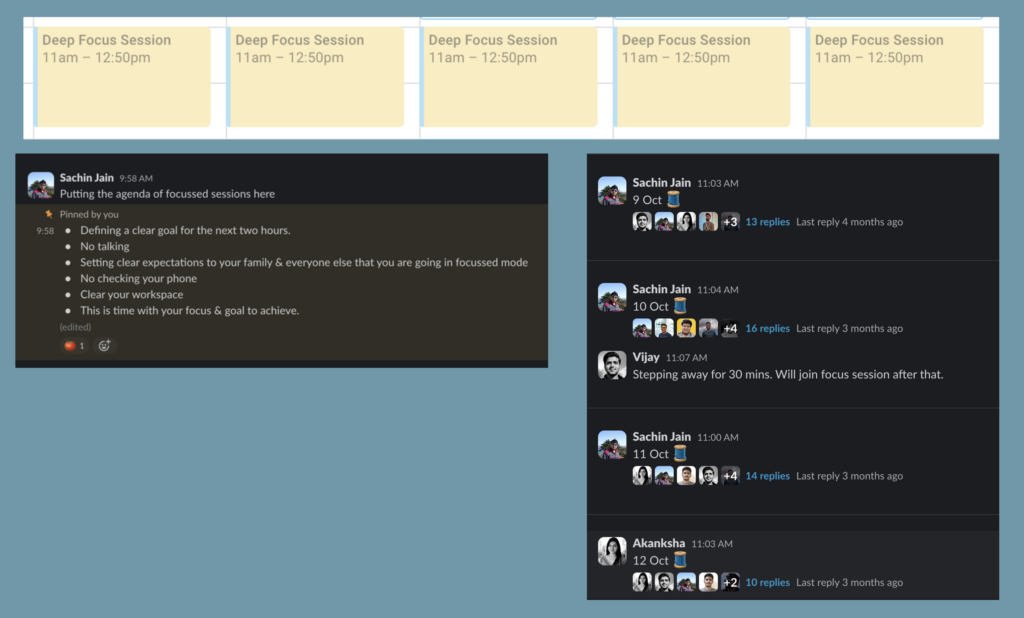In the ever-evolving landscape of modern work, the concept of remote working has transitioned from a novelty to a necessity. Once seen as a perk offered by a handful of companies, remote work has surged to the forefront of the global work culture, particularly in the wake of unprecedented events like the COVID-19 pandemic. Although the pandemic has taught us how to work remotely, This shift has sparked a lively debate: as the world gradually returns to normalcy and big tech companies started opening offices and calling (read forcing) employees to find their way back, Should companies revert to traditional office-based work, or is the remote work model here to stay?
In this article, we will share our perspective on remote working and how we make it successful at our company. Drawing from our experience, we believe remote work can be more than just a makeshift arrangement; it can be a sustainable, productive, and fulfilling way to work.
In this article, we will cover the following —
- Which is better – Remote or In-person Office work
- Benefits of Remote Work – Why do we work remotely?
- Challenges of Remote Work
- How do we solve remote work challenges at SaturnHQ?
- Some Good practices we follow
Which is a better way of working?
There’s no right or wrong answer here. Either option has pros and cons. With In-person office work, it is hard to go into a focussed more, there are many distractions, commute takes away a lot of time & energy, etc. While remote working requires a lot of self-discipline, it is very easy to get dragged into many work chores, hard to communicate with fellow teammates, etc.
We believe it is up to the leadership team what they believe in and how do they design the company and invest in systems to make that system work.
Traditionally, everyone used to go to an office and thousands of people have worked together in the same building. We also have the likes of Zapier, Hotjar & Gitlab (References) that are fully remote from Day0.
Why did we choose remote work (Benefits)?
- Productivity – This is the biggest reason why we are remote. Remote work allows us to go into the flow state – in which we can do the most creative work of our lives. It is absolutely important to invest in your desk & room setup to get more productive.
- Hiring – Hiring also becomes slightly easier when we are remote. Location doesn’t become a constraint anymore and we can also hire overseas in the future. We can optimize the best talent pool than the location with the remote setup.
- Commute is a waste of time & energy (physical & mental) – Commute even for an hour a day is pure waste. Time and energy are irreversible and this precious time should be spent wisely be it on work, or family members.
- Savings on Rent, Commute & Operations – Working from home saves us some capital from rent, commute & other expenses that we’d spend otherwise to manage an additional home, food & other expenses.
- Life is more than work – We’re fortunate enough to be able to design our life around work. Remote work allows us to stay close to our family. Having lunch with our family, taking our dog for a walk, and playing with the kids is only possible with a remote setup.
- Physical & Mental fitness – With remote work, we can (& should) carve out an hour block for taking care of our physical & mental fitness. It’s easier said than done and we encourage everyone to invest time in physical & mental fitness and the remote setup allows this.
Challenges of Remote Work
Having defined the benefits of remote working, it comes with its own set of challenges —
- Team Bonding – We can only work as a team when we know each other better and when we trust each other. Building trust over Zoom calls is very hard.
- Zoom Fatigue – Having too many meetings can cause Zoom fatigue and drain a lot of your energy.
- Decision Making – We need the right data & the right people in the room to make decisions faster. It is hard to get everyone at the same time in a remote setup.
- Availability & Communication – With In-person work, there is a clear boundary and people know if you haven’t come or have left the office but with remote work, we get the flexibility to define our boundaries and that means an additional overhead for us to communicate well when you aren’t available.
- Moonlighting – Many founders have also expressed that some remote employees did moonlighting leading to low productivity & against the company policy.
- Lack of Motivation – Many founders I have interacted with mentioned this as a big challenge that some people at home lack motivation and bringing them to the office fixed the problem.
How we solve Remote Work challenges
Once we know what challenges our company has (not all), we have designed some practices & systems to be able to make remote working successful. Here is a list –
Defining What Remote Work Means
Before solving the challenges of remote working, we need to understand what remote work means for us. Working remotely may mean different in different companies. The way we see remote work is working from the luxury of our homes but carrying the same attitude that we carry with in-person work.
Solving Team Bonding
With everyone being remote, it is hard for people to gel better. We want to build an organization where people enjoy working and where “work” doesn’t feel like “work”. This can only happen when you feel comfortable in the organization ask whatever you want, and have a good relationship with your teammates. To improve team bonding, we do
- OffSites 🏝️
- Monthly Lunches 🍱 with teammates in the city.
- Regular 1-1s
Decision Making
Here is what we do to make our decision-making easy & faster.
- Weekly Analytics sync – Checking our core product, marketing & features analytics to bring everyone on the same page.
- Monthly leadership meeting (Casual – No Agenda meeting)
- Founders stay together and invite new joiners to stay with us for a couple of weeks to get some face time and understand the product, and company better with direct interaction.
Focus Sessions
We do focus sessions every day from 11 AM – 1 PM where every team member joins a Google Meet with their Audio & Video OFF, we create a thread in Slack channel and define our goal for the focus session and update at the end of focus session how was our focus and how much goal did we achieve. It is a great system to keep our teammates accountable to utilize the focus session very well.
Here are some ground rule of our focus session
- Defining a clear goal for the next 2hours
- No talking
- No pinging each other on Slack
- Set the correct expectations to your family members that you’re going in a flow state
- Clear your workspace
- Keep your phone away

Weekly Townhalls (TGIFs)
Lastly, We wrap our week with a weekly town hall where every function (Product, Marketing, Sales, Engg, etc) presents their most important KPIs, and what was achieved this particular week. We also do demos and in the second half we do some fun activities like sharing the best moment of the week, or what we learned this week and the rule is everybody participates.
Some practices we follow
We also follow certain practices to make our remote work more efficient —
- We encourage everyone to take short breaks but if you’re unavailable for more than an hour, please update your Slack status accordingly
- Daily 2hour Focus Session from 11 AM – 1 PM
- It doesn’t mean we have to wear suits & ties but simply put we have to be sober every day.
- Start your work after the usual morning routine that you’d with an office like bathing, breakfast, etc.
- Push your work & travel as much as possible on weekends.
- Set up and organize your work desk to improve your focus & productivity.
- Always have your Cameras ON during the meetings from 10 AM-8 PM. Use a blur/virtual background in case you are not comfortable with the surroundings.
- If you’re in a noisy place, you can use Krisp.ai for background noise cancellation. Usually, the free plan should work fine, but if you need a paid plan we can take it for you
- Written & Async communication – PRDs, Documentation, etc Everything is documented in notion.
Conclusion
The intention of this article is just to share a reference on how remote working can be made successful. We’re still learning and growing as a company and keep on evolving how we work. As a company, You can lean towards either way, It is more of a design choice than cost. If you decide to go with remote work, make sure to invest in employee well-being, and systems to make remote working better and efficient.




